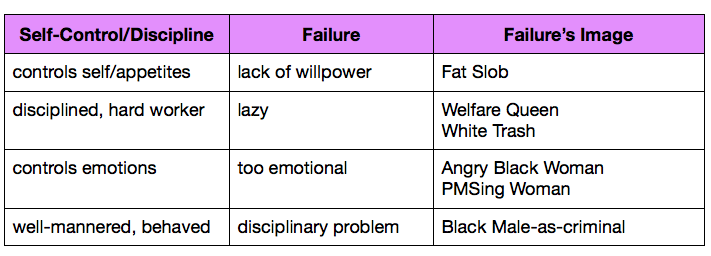Yesterday, I listed off 4 reasons (among many others) for why I refuse/reject/resist using or claiming the terms, “self-control” or “discipline”:
one: They conjure up damaging images and reinforce problematic understandings of who is/isn’t able to have control and be disciplined.
two: They are frequently linked to a particular set of conservative values (a la Bill Bennett).
three: They are shaped by a very narrow vision of success/happiness that is unwanted and/or unachievable by many.
four: They are privileged at the expense of a number of other, equally (or more) important values, like respect, responsibility, attentiveness, vulnerability.
In part 2 of this series, I want to focus on reason #1: Troubling images and understandings. Much of how we understand “self-control” and “discipline” is constructed through the repeated citing of its failures, represented by various non-normative bodies in a variety of oppressive images which, when repeated enough, become ingrained understandings (stereotypes) of entire groups. These images of failure function as threatening reminders of what we will become if we don’t act properly and with self-control and discipline; they haunt our actions and keep us in line. They also reduce the people who are recognized as failing to oppressive stereotypes. I come to the idea of the haunting/threatening image through J Butler and her understandings of the abject in Gender Trouble and Bodies That Matter. For more on understanding of abject, see this class summary).
Here are (just a few) examples of these images:
There are many problems with reinforcing these images. For example, if failure’s image of a lack of willpower is “the Fat Slob,” fat becomes equated with failure and the inability to have control. This leads to understandings of all fat people as lacking willpower and being weak slobs, which leads to the stigmatization of people who fall outside of our accepted weight ideals (either determined by pounds and the medical profession’s ever-changing obesity charts or by appearance and pop culture’s regulations of who/what is beautiful), which leads to the dehumanizing of those non-normative bodies. Here’s just one example of the reinforcing of fat = lack of willpower = stupid slob (so disturbing). And here’s a list of blogs by fat studies scholars/activists/bloggers that challenge this dehumanizing equation of fat = failure.
In another example, if failure’s image of the lazy (non) worker is the Welfare Queen, most frequently represented by the single Black mother, receiving Welfare becomes equated with failure and a refusal to be disciplined and work hard. This leads to understandings of all welfare recipients as lazy and undeserving of a “free” handout from others who actually are disciplined and work hard, which leads to the stigmatization of Welfare, and particularly those who are assumed to receive it the most, Black single mothers. This in turn leads to the dehumanizing of those who are unable to get jobs or who must, for a variety of reasons, many of which are out of their control, depend on Welfare. Here’s one critical tracing of the welfare queen stereotype. You should also check out Patricia Hill Collins’ classic Black Feminist Thought, particularly her chapter: Mammies, Matriarchs, and Other Controlling Images.
I could go on and on about how these threatening images of failure are damaging to all sorts of folks who fall outside of the mythical norm, like how young black men are frequently read as disciplinary problems and written off as future criminals or how any expression of emotion by women of color, in particular, black women, is understood to signal a failure to control one’s anger and show restraint, or how HIlary Clinton was dismissed as a viable presidential candidate because her PMS would cause her to be too emotional and unstable at certain times of the month. But in the interest of making this post less than 1000 words, I’ll stop…for now.
My point in briefly discussing these damaging images of self-control’s failure is not that every time someone uses the terms “self-control” or “discipline” they are deliberately trying to dehumanize fat people as weak slobs or stigmatize welfare recipients as “Welfare queens.” Instead, the point is that these terms are inextricably tied, in the public imagination, to threatening images of what happens when you fail to have control or be disciplined. When these words are used, they invoke a whole history of meanings that, in my undisciplined opinion, are too invested in regulating and reproducing the mythical norm.
We need new terms and understandings for the values that “self-control” and “discipline” claim to represent. Maybe we also need some new values that contribute to our surviving and thriving that don’t emphasize staying in line and unquestioningly follow orders? More on those thoughts in a future post…
As a final thought: I struggled in writing this post. Having spent so much time over the past decade thinking about the problems with controlling people’s “excessive” behavior through threats and calls for “self-control” and “discipline,” I wonder if I was able to effectively introduce this critique to a reader who is not familiar with it. Any feedback is greatly appreciated.


Just found a great article (via @mary_churchill) on how Black Students Face More Harsh Discipline.
It’s important to think about who is supposed to need discipline more, and at what costs. Just another example of how loaded the term “discipline” (and “disciplinary problem”) is.